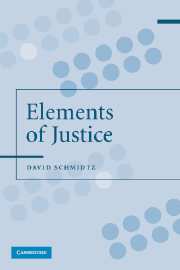Book contents
- Frontmatter
- Contents
- Acknowledgments
- PART 1 WHAT IS JUSTICE?
- 1 The Neighborhood of Justice
- 2 The Basic Concept
- 3 A Variety of Contestants
- 4 Contextual Functionalism
- 5 What Is Theory?
- PART 2 HOW TO DESERVE
- PART 3 HOW TO RECIPROCATE
- PART 4 EQUAL RESPECT AND EQUAL SHARES
- PART 5 MEDITATIONS ON NEED
- PART 6 THE RIGHT TO DISTRIBUTE
- References
- Index
3 - A Variety of Contestants
Published online by Cambridge University Press: 05 June 2012
- Frontmatter
- Contents
- Acknowledgments
- PART 1 WHAT IS JUSTICE?
- 1 The Neighborhood of Justice
- 2 The Basic Concept
- 3 A Variety of Contestants
- 4 Contextual Functionalism
- 5 What Is Theory?
- PART 2 HOW TO DESERVE
- PART 3 HOW TO RECIPROCATE
- PART 4 EQUAL RESPECT AND EQUAL SHARES
- PART 5 MEDITATIONS ON NEED
- PART 6 THE RIGHT TO DISTRIBUTE
- References
- Index
Summary
Thesis: Justice has several elements. No simple principle is right for every context.
ACCOUNTING FOR THE APPEARANCE OF PLURALISM
In a case of child neglect, we plausibly could say justice requires parents to tend to the child's needs. By contrast, if a century ago we had wondered whether women should be allowed to vote, it would have been beside the point to wonder whether women need to vote, because in that context what women were due was acknowledgement – not of their needs but of their equality as citizens. Talking as if justice is about meeting women's needs would have been to treat women as children. One way to account for such facts is to say different contexts call for different principles. Justice is about giving people their due; if we are not discussing what people are due, then we are not discussing justice. Yet, what people are due varies.
A MULTIPLICITY OF PRINCIPLES
Theories of justice typically are assembled from one or more of the following four elements. Principles of equality say people should be treated equally – providing equal opportunity, ensuring equal pay for equal work, and so on – or that people should have equal shares of whatever is being distributed.
Principles of desert say people ought to get what they deserve. People should be rewarded in proportion to how hard they work, or how much risk they bear in undertaking a given line of work, or how well they satisfy their customers.
- Type
- Chapter
- Information
- The Elements of Justice , pp. 13 - 16Publisher: Cambridge University PressPrint publication year: 2006



